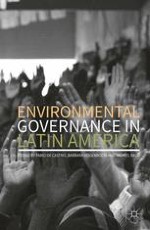Open Access 2016 | Open Access | Buch

Environmental Governance in Latin America
herausgegeben von: Fábio de Castro, Barbara Hogenboom, Michiel Baud
Verlag: Palgrave Macmillan UK
Open Access 2016 | Open Access | Buch

herausgegeben von: Fábio de Castro, Barbara Hogenboom, Michiel Baud
Verlag: Palgrave Macmillan UK
This book is open access under a CC-BY license.
The contributors investigate a broad range of emerging socio-environmental challenges faced by contemporary Latin America. By using environmental governance as an overarching analytical concept, they cross territorial, sectorial, and institutional boundaries to address the nature/society nexus.